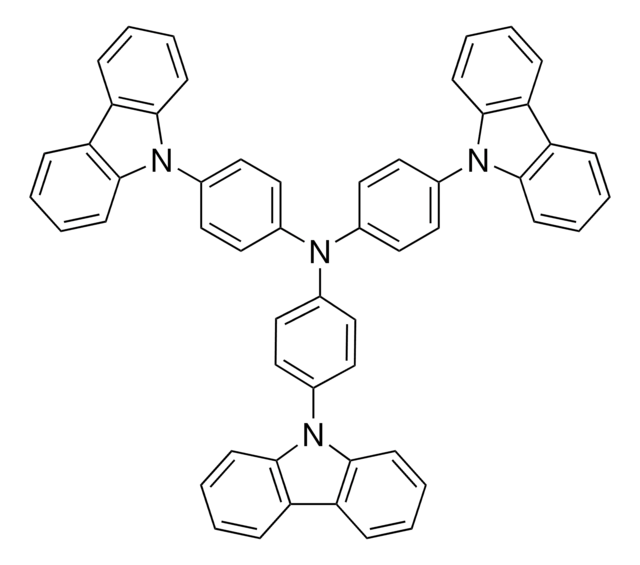556696
N,N′-Di(1-naphthyl)-N,N′-diphenyl-(1,1′-biphenyl)-4,4′-diamine
sublimed grade, 99%
Synonym(s):
N,N′-Bis(naphthalen-1-yl)-N,N′-bis(phenyl)benzidine, NPB, NPD
About This Item
Recommended Products
grade
sublimed grade
assay
99%
loss
0.5 wt. % loss on heating, 345°C (typical, TGA)
mp
279-283 °C (lit.)
orbital energy
HOMO 5.5 eV
LUMO 2.4 eV
OLED device performance
ITO/NPD/TCTA/BCPO:Ir(piq)3 (7-8%)/BCP/Alq3/LiF/Al
ITO/NPD/TCTA/BCPO:Ir(ppy)3 (7-8%)/BCP/Alq3/LiF/Al
ITO/NPD/mCP/BCPO:FIrpic (8%)/TAZ/LiF/Al
ITO/PEDOT:PSS/NPD/TCTA/m-CBTZ:Ir(Bt)2(acac) (10%)/TPBI/LiF/Al
SMILES string
c1ccc(cc1)N(c2ccc(cc2)-c3ccc(cc3)N(c4ccccc4)c5cccc6ccccc56)c7cccc8ccccc78
InChI
1S/C44H32N2/c1-3-17-37(18-4-1)45(43-23-11-15-35-13-7-9-21-41(35)43)39-29-25-33(26-30-39)34-27-31-40(32-28-34)46(38-19-5-2-6-20-38)44-24-12-16-36-14-8-10-22-42(36)44/h1-32H
InChI key
IBHBKWKFFTZAHE-UHFFFAOYSA-N
Looking for similar products? Visit Product Comparison Guide
General description
Application
Storage Class
11 - Combustible Solids
wgk_germany
WGK 3
flash_point_f
Not applicable
flash_point_c
Not applicable
ppe
Eyeshields, Gloves, type N95 (US)
Choose from one of the most recent versions:
Already Own This Product?
Find documentation for the products that you have recently purchased in the Document Library.
Articles
Plexcore® organic conductive inks are electronic grade inks formulated for use in the hole injection layers of OLEDs.
Sublimed materials for organic electronic devices such of OFETs and OTFTs allow the achievement of better electronic properties, and may help increase a device’s lifetime.
Organic Semiconductor Laser Materials
Professor Shinar highlights low-cost, disposable sensor configurations in organic and hybrid electronics for healthcare applications.
Our team of scientists has experience in all areas of research including Life Science, Material Science, Chemical Synthesis, Chromatography, Analytical and many others.
Contact Technical Service





![Poly[2-methoxy-5-(2-ethylhexyloxy)-1,4-phenylenevinylene] average Mn 40,000-70,000](/deepweb/assets/sigmaaldrich/product/structures/344/488/b8f8179d-3970-4deb-a754-adda88cdb36f/640/b8f8179d-3970-4deb-a754-adda88cdb36f.png)
![4,4′,4′′-Tris[phenyl(m-tolyl)amino]triphenylamine 98.0%](/deepweb/assets/sigmaaldrich/product/structures/370/101/1022653f-ed3b-4991-a82c-269ad710b908/640/1022653f-ed3b-4991-a82c-269ad710b908.png)